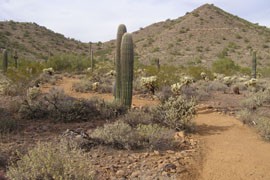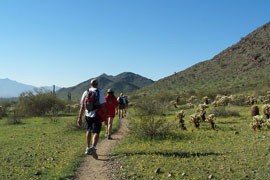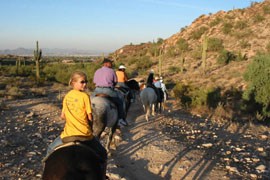Cronkite News has moved to a new home at cronkitenews.azpbs.org. Use this site to search archives from 2011 to May 2015. You can search the new site for current stories.
Parks get middling scores in national ranking, officials cite budget woes
WASHINGTON – Arizona’s municipal parks ranked no better than 16th on a list of the 40 largest cities in the country, a ranking that local officials grudgingly accepted.
Park officials in Phoenix, Mesa and Tucson acknowledged there are areas where they can do better, but also said their scores on the ParkScore Project were likely depressed by recent budget woes. Finances touched on everything from projects that had to be shelved to their ability to water the grass and keep the parks green.
“They didn’t take into consideration the downturn of the economy. Current programs had to be put on hold for us until the economy gets better,” said Lily King-Cisneros, a spokeswoman for Mesa Parks and Recreation.
Mesa tied for 36th place on the list, which was produced by the Trust for Public Land’s Center for City Park Excellence. Phoenix shared the 16th spot with two other cities and Tucson was tied for 31st.
The report analyzed median park size, the number of parks in a city, the number of playgrounds and the amount spent per resident, and the percentage of the population living within a 10-minute walk of a park.
Phoenix Parks and Recreation officials were not surprised by the rankings, but a spokesman said the comparison probably was skewed by the city’s desert preserves. That added to the department’s acreage score, but as non-traditional parks they detracted from other aspects of the score.
“We have pristine Sonoran Desert that’s set aside for hiking, recreation and appreciation, but you’re not going to have a playground in the desert,” the spokesman, David Urbinato, said.
He said the city has become more focused on improving existing parks instead of building new ones, because of budget constraints.
Mesa is also looking at improvements, King-Cisneros said. Her department currently has several programs and improvement projects in the planning stages, and is wrapping up a month of town hall-style meetings to get public feedback before it begins to implement them.
Tucson Parks and Recreation Director Fred Gray said he is not surprised by his department’s rank, and will use the report as a resource for future planning.
“The most glaring deficiency is parkland in general,” he said. “But we’ve identified a list of needs we’ll try to secure funding for in the future.”









